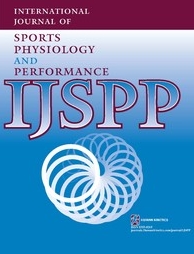Donghi F1, Rampinini E1, Bosio A1, Fanchini M2, Carlomagno D1, Maffiuletti N3
1, Mapei Sport Research Centre, Human Performance Laboratory, Olgiate Olona, VA, Italy; 2, Performance Department, AS Roma Football Club, Piazzale Dino Viola, 1, 00128, Rome, RM, Italy; 3, Human Performance Lab, Schulthess Clinic, Lengghalde 6, 8008, Zurich, Switzerland.

ABSTRACT
Purpose: To compare the effects of different modalities of morning priming exercise on afternoon physical performance with the associated hormonal and psychophysiological responses in young soccer players.
Methods: In a randomized counterbalanced crossover design, 12 young soccer players completed 3 different morning conditions on 3 different days: repeated-sprint running (6 × 40 m), easy exercise (4 × 12 fast half squats, 6 speed ladder drills, and 20-m sprints), and control (no exercise). Blood testosterone and cortisol concentrations were assessed upon arrival (approximately 8:30AM) and approximately 5 hours and 30 minutes later. Body temperature, self-reported mood, quadriceps neuromuscular function (maximal voluntary contraction, voluntary activation, rate of torque development, and twitch contractile properties), jump, and sprint performance were evaluated twice per day, while rating of perceived exertion, motivation, and the Yo-Yo Intermittent Recovery level 2 (IR2) tests were assessed once per day.
Results: Compared with the control, repeated-sprint running induced a possible positive effect on testosterone (+11.6%) but a possible to very likely negative effect on twitch contractile properties (-13.0%), jump height (-1.4%), and Yo-Yo IR2 (-7.1%). On the other hand, easy exercise had an unclear effect on testosterone (-3.3%), resulted in lower self-reported fatigue (-31.0%) and cortisol (-12.9%), and had a possible positive effect on the rate of torque development (+4.3%) and Yo-Yo IR2 (+6.5%) compared with the control.
Conclusions: Players’ testosterone levels were positively influenced by repeated-sprint running, but this did not translate into better physical function, as both muscular and endurance performance were reduced. Easy exercise seemed to be suitable to optimize the physical performance and psychophysiological state of young soccer players.
Keywords: delayed potentiation; match day; readiness; team sport.
Int J Sports Physiol Perform. 2021 Jan; Online ahead of print.
PMID: 33401241 doi: 10.1123/ijspp.2020-0094